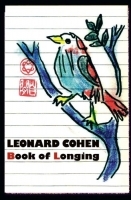
Review by Stephen Morrissey.
Leonard Cohen has excelled at all of his creative endeavours, as a poet, a novelist, and as a songwriter. Whether he is compared to his singer-songwriter contemporaries Joni Mitchell and Neil Young, or compared to Margaret Atwood—the only Canadian literary contemporary equal to Cohen in terms of fame—he is among the most creative and accomplished writers Canada has produced.
Cohen’s Book of Longing is made up of poems written over the last thirty years and includes on almost every page original drawings that he made of himself and other subjects. Book of Longing is not a major book in Leonard Cohen’s body of work. Some of the poems are very good, but it is mostly a collection of odds and ends: it includes poems written in the 1970s; some newer poems; song lyrics from one of Cohen’s CDs; some poems that might have been better discarded than included in this book; and some prose poems that didn’t fit into his previous books.
One reason this collection isn’t one of Cohen’s best efforts is that the poems communicate a psyche that is relentlessly self-preoccupied and self-absorbed; I don’t know whether this is because these poems are not his best work, or because they are an accurate representation of Cohen’s psyche. However, I suspect that some of these poems would have been removed had there been more work to choose from. For example, in “Titles”, Cohen writes,
I had the title Poet
and maybe I was one
for a while
Also the title Singer
was kindly accorded me
even though
I could barely carry a tune
For many years
I was known as a Monk
I shaved my head and wore robes
and got up very early
I hated everyone
and no one found me out
My reputation
as a Ladies’ Man was a joke
It caused me to laugh bitterly
through the ten thousand nights
I spent alone
From a third-storey window
above the Parc du Portugal
I’ve watched the snow
come down all day
As usual
there’s no one here
There never is
Mercifully
the inner conversation
is cancelled
by the white noise of winter…
(159)
A poem will almost always reveal something of the psyche of the author, as Cohen’s is evident in this book. The problem with Book of Longing is that the psyche in the poems quickly becomes tedious because anyone’s psyche–even Leonard Cohen’s–without crisis or a sense of urgency to discover something beyond itself, or some greater understanding, is not interesting. As a result, we get poems like “The Remote” in which Cohen writes,
I often think about you
when I’m lying alone in
my room with my mouth
open and the remote
lost somewhere in the bed
(97)
The unfortunate side to Cohen’s self-preoccupation is that issues that call for depth are trivialized and deflated by his juxtaposing something trite with something important. This produces a charming self-deprecating humour, which is disarming on the surface, but which can also slip over the edge into smugness.
Some of the poems included in the book are song lyrics that were recorded on his album Ten New Songs (2001): “Alexandra Leaving,” “Love Itself,” “Here It Is,” “By The Rivers Dark,” “Boogie Street,” and “You Have Loved Enough”; one of the best of these songs is “A Thousand Kisses Deep”:
The ponies run the girls are young
The odds are there to beat
You win a while and then it’s done
Your little winning streak
And summoned now to deal
With your invincible defeat
You live your life as if it’s real
A thousand kisses deep.
(87)
Cohen’s best song lyrics have a depth and complexity not found in many of these poems. Cohen’s songs are well known for creating an atmosphere that moves the audience; this is something at which Cohen excels. Most song lyrics rarely achieve the sophistication of lyrical poetry; instead, they require music to carry the emotional content of the words and by themselves are rarely interesting to read. Cohen’s song lyrics have the rare quality of being able to stand alone as poems, and this attests to Cohen’s talent as a writer.
Overall, there are some good poems in Book of Longing, but it is not a great book of poems. The book’s importance lies in Cohen’s authorship; it is an addition to his impressive body of work, which is extensive and shows a life-long dedication to poetry and writing.
Stephen Morrissey has published seven books of poetry, as well as chapbooks. In 2004, Les Editions Triptyque published La bête mystique, a translation of Morrissey’s The Mystic Beast. His new collection of poems, Girouard Avenue, is forthcoming.
